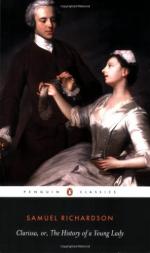Do so. Be pleased to read on, Mr. Hickman.
He did very formally, as if I remembered not what I had written; and when he came to the passage about the halter, the parson, and the hangman, reading it, Why, Sir, says he, does not this look like a jest?—Miss Howe thinks it does. It is not in the lady’s power, you know, Sir, to doom you to the gallows.
Then, if it were, Mr. Hickman, you think she would?
You say here to Miss Howe, proceeded he, that Miss Harlowe is the most injured of her sex. I know, from Miss Howe, that she highly resents the injuries you own: insomuch that Miss Howe doubts that she shall never prevail upon her to overlook them: and as your family are all desirous you should repair her wrongs, and likewise desire Miss Howe’s interposition with her friend; Miss Howe fears, from this part of your letter, that you are too much in jest; and that your offer to do her justice is rather in compliment to your friends’ entreaties, than proceeding form your own inclinations: and she desires to know your true sentiments on this occasion, before she interposes further.
Do you think, Mr. Hickman, that, if I am capable of deceiving my own relations, I have so much obligation to Miss Howe, who has always treated me with great freedom, as to acknowledge to her what I don’t to them?
Sir, I beg pardon: but Miss Howe thinks that, as you have written to her, she may ask you, by me, for an explanation of what you have written.
You see, Mr. Hickman, something of me.—Do you think I am in jest, or in earnest?
I see, Sir, you are a gay gentleman, of fine spirits, and all that. All I beg in Miss Howe’s name is, to know if you really and bona fide join with your friends in desiring her to use her interest to reconcile you to Miss Harlowe?
I should be extremely glad to be reconciled to Miss Harlowe; and should owe great obligations to Miss Howe, if she could bring about so happy an event.
Well, Sir, and you have no objections to marriage, I presume, as the condition of that reconciliation?
I never liked matrimony in my life. I must be plain with you, Mr. Hickman.
I am sorry for it: I think it a very happy state.
I hope you will find it so, Mr. Hickman.
I doubt not but I shall, Sir. And I dare say, so would you, if you were to have Miss Harlowe.
If I could be happy in it with any body, it would be with Miss Harlowe.
I am surprised, Sir!——Then, after
all, you don’t think of marrying Miss
Harlowe!——After the hard usage——
What hard usage, Mr. Hickman? I don’t doubt but a lady of her niceness has represented what would appear trifles to any other, in a very strong light.
If what I have had hinted to me, Sir—excuse me—had been offered to the lady, she has more than trifles to complain of.
Let me know what you have heard, Mr. Hickman? I will very truly answer to the accusations.




